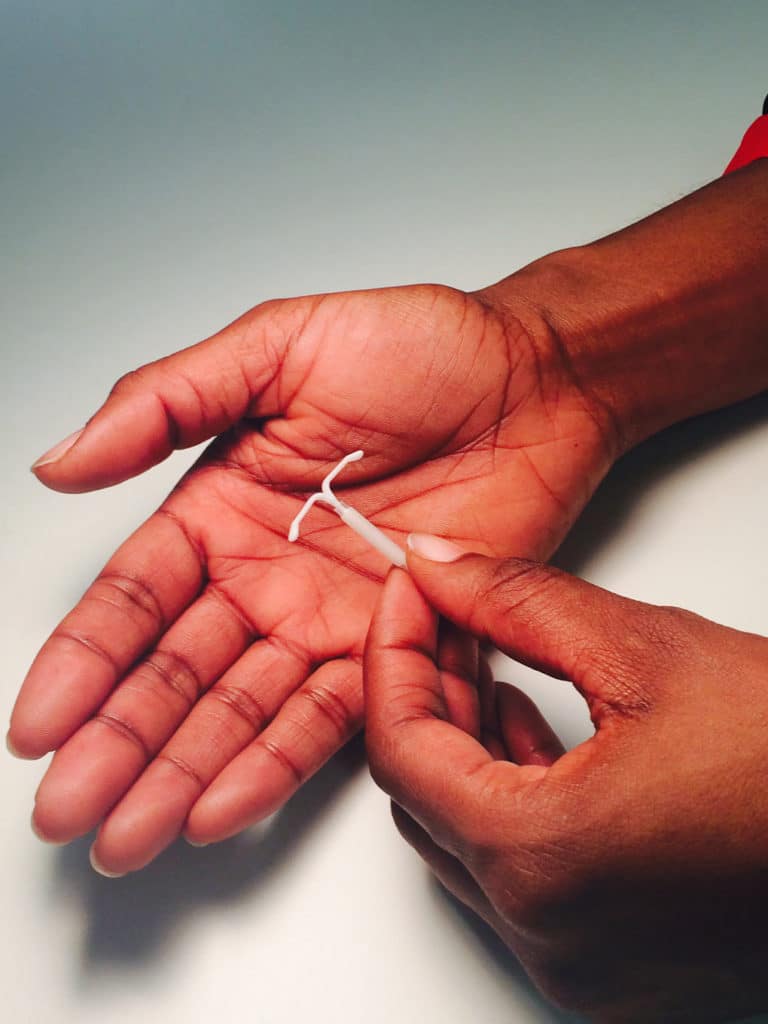

PRODUCT DESCRIPTION
Avibela™ is a hormonal IUD (levonorgestrel-releasing intrauterine system, 52 mg) indicated for contraception and heavy menstrual bleeding, with duration of use up to 6 years depending on local regulatory approvals.
- The mechanism of action for contraception is thickening of the cervical mucus that inhibits the passage of sperm.
- The mechanism of action for treatment of heavy menstrual bleeding is thinning of the uterine lining.
This IUD has been registered in more than 40 countries since 2012 under various brand names. These include multiple Stringent Regulatory Authority (SRA) approvals, including the U.S. FDA in 2015.
Medicines360TM, through its wholly owned subsidiary Impact RH360TM, is working to make this product available in Africa, South and Southeast Asia, and Central America and the Caribbean under the brand name AVIBELA.
KEY CLINICAL CHARACTERISTICS
Highly effective long-acting reversible contraceptive
More than 99% effective at preventing pregnancy for up to six years1
Studied in a broad range of women
- 1,751 women ages 16-452
- 58% nulliparous (having never given birth)2
- BMI range 16-62 and average 272
Effective at treating heavy menstrual bleeding
Women with heavy menstrual bleeding experience an 88% decrease in the volume of menstrual bleeding by the end of three months of use, and an 82% reduction is sustained for 12 months (based on a 12-month study)1Same-day insertion is possible
Can be inserted at any time, including the same day as the initial visit to the clinic (if the provider is reasonably certain the woman is not pregnant)11Avibela (levonorgestrel-releasing intrauterine system) 52 mg [Summary of Product Characteristics and Prescribing Information]. Impact RH360; 2022.
2Eisenberg, D. et al. Three-year efficacy and safety of a new 52-mg levonorgestrel-releasing intrauterine system. Contraception 92 (2015) 10-16.
AVAILABILITY
AVIBELA can be made available in the 88 countries shown in the map below. AVIBELA is currently registered in Kenya, Madagascar, Nigeria, Rwanda, Tanzania, Uganda, and Zambia.
Available (81 countries)
Registered* (7 countries)

* As of November 2022
HOW TO ACCESS AVIBELA
Public Sector
Medicines360, through its wholly owned subsidiary Impact RH360, offers a subsidized access price for AVIBELA through 2024, for all units ordered through international procurement group catalogs or on behalf of eligible public sector programs.
Social Marketing and Private Sectors
Impact RH360 works with social marketing organizations and commercial partners to make AVIBELA available outside of the public sector.
For more information, please complete the contact form.
Contact Us
Medicines360 respects individual privacy and values the confidence of our customers. By submitting the information above, you understand this information will be used in accordance with our Privacy Policy. You further acknowledge that Medicines360 and its business partners may send you relevant information regarding disease education, as well as information on related products or services, and for marketing or other informational purposes. You may opt out of receiving such communications by unsubscribing directly from emails sent to you or sending an email request to the address below. Your choices regarding our use and disclosure of your Personal Information:
We give you many choices regarding our use and disclosure of your Personal Information for marketing purposes. You may opt out from:
- Receiving marketing-related emails from us: If you no longer want to receive marketing-related emails from us on a going-forward basis, you may opt out of receiving these marketing-related emails by following the instructions included in email communications from us, or contact us at: access@medicines360.org.
- Our sharing of your Personal Information with affiliates for their marketing purposes: If you would prefer that we do not share your Personal Information on a going-forward basis with our affiliates for their marketing purposes, you may opt out of this sharing by notifying us sending us a written statement to: AVIBELA Website, 49 Stevenson St | Suite 1100 | San Francisco, CA 94105 USA, by following the instructions included in email communication you received from us, or by contacting us at: access@medicines360.org.
ADDITIONAL RESOURCES
*This version of the labeling is currently approved in Kenya, Nigeria, Uganda, and Zambia, and is under review in Rwanda and Tanzania. The French translation of this labeling is approved in Madagascar. Please contact us if you have any questions about approved labeling in your country.
IMPORTANT SAFETY INFORMATION
AVIBELA Important Safety Information
Who is not appropriate for AVIBELA
Contraindications to use of AVIBELA include: pregnancy; use for post-coital contraception (emergency contraception); acute pelvic inflammatory disease (PID) or endometritis or a history of PID unless there has been a subsequent intrauterine pregnancy; infected abortion in the past 3 months; known or suspected uterine or cervical neoplasia; acute liver disease or liver tumor (benign or malignant); conditions associated with increased susceptibility to pelvic infections; congenital or acquired uterine anomaly, including fibroids, that distorts the uterine cavity and would be incompatible with correct IUS placement; uterine bleeding of unknown etiology; untreated acute cervicitis or vaginitis, including bacterial vaginosis, known chlamydial or gonococcal cervical infection, or other lower genital tract infections until infection is controlled; known or suspected breast cancer or other hormone-sensitive cancer, now or in the past; a previously inserted IUS that has not been removed; a history of hypersensitivity reaction to any component of AVIBELA (reactions may include rash, urticaria, and angioedema).
Clinical considerations for use of AVIBELA
Use AVIBELA with caution after careful assessment in patients with coagulopathy or who are taking anticoagulants; migraine, focal migraine with asymmetrical visual loss, or other symptoms indicating transient cerebral ischemia; exceptionally severe or frequent headache; marked increase of blood pressure; or severe arterial disease such as stroke or myocardial infarction. Consider removal of the IUS if any of these conditions arise during use. Also consider removing AVIBELA if uterine or cervical malignancy, or jaundice arise during use.
IUSs have been associated with an increased risk of PID, most likely due to organisms being introduced into the uterus during insertion. About 1/3 of women diagnosed with PID developed the infection within a week of AVIBELA insertion, while the remainder were diagnosed more than six months after insertion. PID is often associated with sexually transmitted infection (STI), and AVIBELA does not protect against STIs. PID or endometritis may be asymptomatic but still result in tubal damage and its sequelae.
Pregnancy related risks with AVIBELA
In the case of pregnancy with AVIBELA in place, advise the woman of the increased risks for pregnancy complications, including miscarriage, premature delivery, infection and sepsis. Ectopic pregnancy should be excluded, and removal of the system should be considered. Removal of AVIBELA or probing of the uterus may result in spontaneous abortion. When a woman becomes pregnant with AVIBELA in place, the relative likelihood of ectopic pregnancy is increased. Ectopic pregnancy may require surgery and may result in loss of fertility. Women with a previous history of ectopic pregnancy, tubal surgery, or pelvic infection have a higher risk of ectopic pregnancy.
Be aware of other serious complications and most common adverse reactions
Some serious complications with IUSs like AVIBELA are sepsis, perforation, and expulsion. Severe infection or sepsis, including Group A streptococcal sepsis (GAS), have been reported following insertion of other LNG-releasing IUSs. Aseptic technique during insertion of AVIBELA is essential in order to minimize serious infections such as GAS.
Perforation (total or partial, including penetration/embedment of AVIBELA in the uterine wall or cervix) may occur, most often during insertion, although the perforation may not be detected until sometime later. Perforation may reduce contraceptive efficacy and result in pregnancy. If perforation is suspected, the IUS should be removed as soon as possible. Delayed detection or removal of AVIBELA in case of perforation may result in migration outside the uterine cavity, adhesions, peritonitis, intestinal perforations, intestinal obstruction, abscesses, and erosion of adjacent viscera.
Partial or complete expulsion of AVIBELA may occur, resulting in the loss of contraceptive protection.
Ovarian cysts may occur and are generally asymptomatic but may be accompanied by pelvic pain or dyspareunia. Evaluate persistent ovarian cysts.
In a large clinical trial of 1751 women using AVIBELA for contraception, very common undesirable effects (occurring in more than 10% of users) include procedural bleeding, vaginal bacterial infections, vulvovaginal mycotic infections, nausea or vomiting, and acne.

